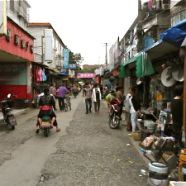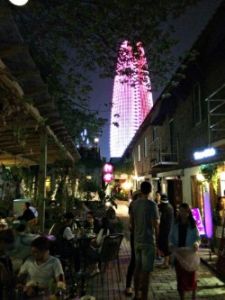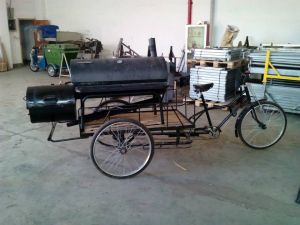Red Meat: Bringing Southern Barbecue to the Middle Kingdom by Bike
With the Han majority making up 91.5% of China’s 1.38 billion citizens, cultural melting pot might not seem, at surface, the most appropriate title. Statistics, like just about everything else in relation to the world’s most populated nation, can be misleading. It’s important to recognize that the remaining 8.5% still represents 117,300,000 people. If China’s minority population were a country, it would be the twelfth-largest country in the world by population, right behind Mexico. It is a population that although often ignored or even unknown to most is remarkably diverse and increasingly on the move.
In 1990, China’s urbanization rate was 26%. By the end of 2015, that number reached just over 56%. The economic success of cities in eastern provinces like Zhejiang, Jiangsu, Fujian, and Shandong encouraged hundreds of millions of people to pack up and leave the central and western areas of the country for the promise of a better life.
As people and money began to flow into these cities, so did foreign citizens eager to explore new opportunities in a country that was off-limits until relatively recently. Over the last decade, the number of foreign nationals living in China exploded, with more than 600,000 holding residence permits in the Middle Kingdom today.
The city of Ningbo in Eastern Zhejiang Province is as indicative of the high side of China’s “economic miracle” as any. Ningbo was home to 1.567 million people in 2000. By the time I left in 2015, the population had grown to more than 7.6 million, and the city now claims an annual GDP of $123.75 billion. Like most other Eastern cities, a solid majority of the population is new there.
The influx of “foreign” culture, both domestic and international, is perhaps most evident in the city’s food. Traditional Ningbonese food is a delicate cuisine based mostly around fish, shellfish, and fresh vegetables. Today, any given neighborhood in the city is likely home to residents and cuisine from all over China and the world. The city’s burgeoning foreign population, weary of McDonald’s, KFC, and Pizza Hut, brought with it a demand for high-quality Western food.
A BBQ Bike Is Born
The story of rapid growth in China becomes a bit of a trope after a while, but it really does factor in to just about every aspect of life there. When I moved to Ningbo in 2010, the city’s foreign population was just beginning to take off. There weren’t many options as far as places to grab a drink, so the small handful of Western foreigners in the city were concentrated into several small pockets.
When you’re trying to make friends and searching for conversation topics, the things you miss from home come up often, especially if you’re from the same country. There’s an old adage that says something along the lines of “it’s not a town until it has a church and a stoplight,” but let me tell you, that list gets a lot longer when cream cheese is a three-hour train ride to Shanghai.
Often these complaints lead to the opening of restaurants and grocers of varying authenticity and success.
I missed bacon. The “bacon” forced upon you in Chinese supermarkets can only be described as a patchwork of hams and fats, like a bacon-shaped baloney. Not bologna. Baloney. It is completely unacceptable in almost any circumstance.
Luckily, a friend had given me a crash course in making bacon a couple of years previously. That bit of training plus a few hours of reading and watching videos online and I cranked out a decent batch my first time through. The problem was, I didn’t have anywhere to smoke it. The first several times I made bacon I took it to different restaurants and asked to use their ovens without mentioning to them that I would be actually burning hickory wood in them. Eventually, a few friends and my now-fiancée pitched in and got me a large side-mount smoker for a Christmas present, I assume under the condition that there was some bacon headed their way.
Nick Jumara, a friend of mine, became my business partner. We started throwing parties at a bar where he was part owner. Nick is from Kansas City, and like myself, a native North Carolinian, he has a deep penchant for barbecue. It only made sense that we’d make use of this new smoker and pit-cook some pork and invite our friends.
China allows for a certain brazenness if you understand the basic cultural principle of maintaining harmony. Don’t cause trouble for anyone, and (mostly) no one will cause trouble for you. While we’d need licenses and planning permission to run a barbecue like this in the United States, in China the only problem we ran into was moving an enormous smoker around.
It just so happened that Nick had bought a sanwenche, a contraption that can best be described as an adult-sized tricycle with a flatbed mounted on the back. Why or how he acquired this thing I have no idea, but a late-night “just one drink” session with some engineer friends led to a revelation. We could mount the smoker onto the flatbed and violà—barbecue bike. We tossed around the idea of putting a motor on it along with some huge exhaust pipes. At one point I asked, jokingly, if the exhaust pipes could shoot flames to which Richard, a talented engineer replied calmly, “Well, do you want them to shoot flames?”
We wisely nixed the idea of a gas engine on a vehicle that held burning coals and decided that we could just be tough about it and pedal. As it turns out, pedaling an enormous smoker around wasn’t much easier than our previous methods of grunting, straining, and swearing through it.
The barbecue bike enjoyed a magnificent run. We cooked hot dogs for a Fourth of July hot dog eating contest on it. We smoked a Thanksgiving turkey on it. We smoked pastrami to bring to Passover on it. We served pulled pork to about two hundred people on Halloween. We enlisted the patient and loving help of our friends and significant others. We built friendships and shared recipes and cultures. The idea that food brings people together might be clichéd, but that doesn’t make it any less true.
For all the eye-popping statistics about foreigners moving to China, the reality is a little less utopian. Foreign communities tend to segregate themselves from the local population, largely due to cultural differences both real and imagined. The opportunity to bring cultures together is more rare than it should be. Foreigners tend to be limited to either hokey “traditional” Chinese culture like calligraphy and ear-piercing Chinese opera or the awkward forced company dinners or nights out at karaoke. Similarly, most of the foreigners Chinese people meet are English teachers who offer a similarly limited perspective on their own culture. In addition, the language barrier often makes even the most outgoing of people shy and nervous in mixed company.
Thankfully, all that shyness and nervousness goes out the window when there’s pulled pork involved.
When we first started with the barbecue bike we had to learn to explain to the locals in Chinese what pulled pork was. We would tell them “hen man man de kao zhu rou” (very slow, slow-cooked pork) and that it was “wo men de te bie de jia li cai” (our special hometown cuisine). The sour, spicy, and smokey flavor of our pulled pork was generally well received. There is a certain look of affirmation on someone’s face when they’re trying something new and decide that they like it.
That’s a look that can be seen throughout China’s cities. Talk to anyone in Ningbo over the age of thirty-five and they’ll probably tell you they don’t eat Sichuan food because it’s too spicy. Ningbo cuisine is pretty much the antithesis of spicy and people who grew up in the city before Sichuan food was readily available just can’t handle the heat. Talk to younger folks, however, and they’re likely to have grown up with the cuisine’s bold and fiery flavors.
The movement of people in, out, and around the country has thrust Chinese society into a state of beautiful cultural chaos. It’s a huge mess for sure, but it’s one that’s left a lot of space for people to share and create. The barbecue bike was special to us, but unremarkable in the larger context of the country. Nearly every street in every city in China is teeming with street food vendors hawking their “special hometown cuisine,” from the dumpling-makers from China’s Northeast to the Uighur barbecue masters serving up freshly slaughtered lamb. For locals and expats alike, new experiences exist around every corner, whether in the form of food, language, travel, business opportunities, or anything else.
The future for China and the one-fifth of the world’s population that calls it home is unclear. A murky economic forecast and an increasingly authoritarian government could mean that this window of rampant cultural exploration could be closing soon. Or maybe not. China is nothing if not unpredictable.
The only thing that is predictable is that China will continue to change and develop. Some say too much. In 2015 a few months before I returned home to North Carolina, KFC China started selling shou si ju rou bao, or a BBQ pulled pork sandwich.










